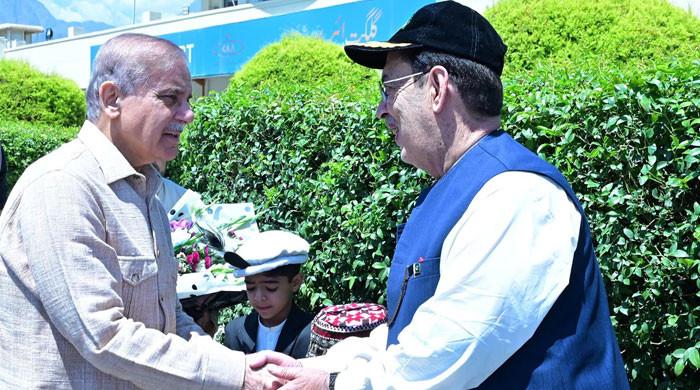PM Shehbaz raises concerns over climate challenges during flood-hit GB visit

- PM Shehbaz Sharif briefed on flood situation, rain damage.
- Federal bodies in contact with the GB govt: PM Shehbaz.
- Measures to address climate change need of the hour, he says.
Prime Minister Shehbaz Sharif on Monday called for measures to address climate change as he visited the flood-hit Gilgit Baltistan, which has witnessed loss of life coupled with damage to infrastructure in recent days due to heavy rains.
“I regret the loss of life and property due to the rains,” said PM Shehbaz while speaking to the media on his GB visit to assess flood and rain damage.
Noting that the federal bodies were in contact with the GB government, the premier shed light on the issue of climate change and the threat that it posed.
“Every year we are affected by climate change [….] Measures to address climate change challenges are the need of the hour,” the PM said as he recalled the 2022 floods, and further added that the Ministry of Climate Change has been instructed to deal with the challenges in this regard.
Reviewing the devastation caused by recent rains in various areas of GB, the PM directed the relevant authorities to work diligently on disaster response and infrastructure resilience.
PM Shehbaz, while chairing a high-level meeting to assess the losses and damages caused by recent rains and cloud-burst incidents in Diamir and surrounding areas, said that the natural disaster resulted in extensive destruction and sadly claimed several lives.
Highlighting Pakistan’s minimal contribution to global emissions, the prime minister stressed that despite the fact that Pakistan contributed almost zero emissions, it was among the top ten nations most affected by climate change-induced disasters.
“Despite Pakistan’s near-zero emissions, we suffer huge devastation every year due to global warming,” he noted.
He further emphasised the importance of global climate conferences, directing the authorities to ensure active participation aimed at securing funds for building resilient infrastructure to combat future disasters.
Earlier, PM Shehbaz — accompanied Minister for Communications Abdul Aleem Khan, Minister for Information and Broadcasting Attaullah Tarar, Minister for Kashmir and Gilgit-Baltistan Affairs Engineer Amir Muqam, Minister for Climate Change Dr Musadik Malik and Adviser Rana Sanaullah — touched down in GB on a day-long visit today and was briefed by Governor Mehdi Shah on the flood situation and damages caused by recent rains.
The PM was also informed about the progress of the ongoing development projects and the law and order situation in the region.
The premier’s visit comes on the heels of a series of tragedies caused by relentless monsoon rains, which have caused at least 299 fatalities, including 140 children, across the country.
In GB’s Babusar Valley, sudden flash floods triggered by cloudbursts swept away tourists and vehicles last week, killing at least six people and leaving several others missing.
In Chilas, Skardu and surrounding areas, more than 200 tourists were left stranded as landslides blocked major roads, including sections of the vital Karakoram Highway.
Rescue operations by the Pakistan Army and civil authorities managed to evacuate many of those trapped.
Additionally, the PM also met GB Chief Minister Gulbar Khan and discussed the law and order situation and development works in the region and also announced establishing Daanish Schools there.
Separately, providing details on the rescue efforts, GB government spokesperson Faizullah Faraq has said that the 14-day-long search operation ended after all vehicles were removed from the debris, and no trace of the missing persons could be found.
“Hopes of finding the missing persons who were swept away in the floods have extinguished,” Faraq said.
23% more rains
The Pakistan Meteorological Department (PMD) has warned of widespread heavy rains starting Monday (today) till August 7.
Azad Jammu and Kashmir and GB, as per the Met Office, are both likely to be hit by this new spell of cloudbursts.
PMD’s forecast comes as the country, during July 2025, witnessed 23% more rains as compared to the normal rainfall, while a 0.1°C increase was also witnessed in the average temperature during the month, The News reported on Monday.
The Met Office’s report said that climatologically, July was considered a rainy month with rainfall contribution to the national annual and seasonal July-September totals being 44.9% and 21.3%, respectively.
During the month, Pakistan experienced heavy to very heavy rainfall at AJK, GB, Khyber Pakhtunkhwa and Punjab.
The July 2025 with 77.7mm rainfall was above average with a positive anomaly of +23 per cent for Pakistan as a whole. Whereas a diverse situation was observed on a regional scale, Punjab with the 163.50mm (+57%) ranked 8th wettest (244.9mm rainfall recorded in 1978) and Gilgit Baltistan, with 20.20mm (+52%), both observed largely above average rainfall.
— With additional input from APP
setTimeout(function(){
var scriptElement=document.createElement(‘script’);
scriptElement.type=”text/javascript”;
scriptElement.setAttribute=”async”;
scriptElement.src=”https://www.geo.tv/assets/front/js/lazysizes.min.js”;
document.body.appendChild(scriptElement);
}, 1000);
//setTimeout(function(){ $(‘.medium-insert-images’).find(‘figure’).show() }, 3000);
var loadDeferredJS = function() {
var lazyloadjs = [‘https://www.geo.tv/assets/front/js/lazysizes.min.js’];
var alljs = [‘https://www.geo.tv/assets/front/js/ui/thirdparty.js?ver=133’];
var jqueryjs = [‘https://www.geo.tv/assets/front/js/ui/jquery.min_new.js?ver=43’];
var bootstrapjs = [‘https://www.geo.tv/assets/front/js/ui/bootstarp.js?ver=55’];
var sliderjs = [‘https://www.geo.tv/assets/front/js/ui/swiper.min.js’];
var firebaseappjs = [‘https://www.gstatic.com/firebasejs/8.10.1/firebase-app.js’];
var firebasejs = [‘https://www.gstatic.com/firebasejs/8.10.1/firebase-analytics.js’,’https://www.gstatic.com/firebasejs/8.10.1/firebase-messaging.js’];
var firebasejs_tokenjs = [‘https://www.geo.tv/assets/front/js/push_notification.js?v=1.511’];
var alljscustom = [‘https://www.geo.tv/assets/front/js/ui/my.js?ver=232366′,’https://www.geo.tv/assets/front/js/mycustom.js?ver=646’];
/*setTimeout(function(){
lazyloadjs.forEach(function (item,index) {
var scriptElement=document.createElement(‘script’);
scriptElement.type=”text/javascript”;
scriptElement.src = item;
document.body.appendChild(scriptElement);
});
}, 500);*/
setTimeout(function(){
jqueryjs.forEach(function (item,index) {
var scriptElement=document.createElement(‘script’);
scriptElement.type=”text/javascript”;
scriptElement.src = item;
document.body.appendChild(scriptElement);
});
}, 1000);
// setTimeout(function(){
// bootstrapjs.forEach(function (item,index) {
// var scriptElement=document.createElement(‘script’);
// scriptElement.type=”text/javascript”;
// scriptElement.src = item;
// document.body.appendChild(scriptElement);
// });
// }, 2000);
const jqueryIntervalcheck = setInterval(function () {
if(typeof jQuery !== “undefined”){
clearInterval(jqueryIntervalcheck);
setTimeout(function(){
sliderjs.forEach(function (item,index) {
if(item == ‘https://www.geo.tv/assets/front/js/ui/swiper.min.js’){
var story_embed_gallery = $(‘.story-area’).find(‘.embedgallery’).length;
//var story_embed_gallery = 0;
if(parseInt(story_embed_gallery) > 0){
var scriptElement=document.createElement(‘script’);
scriptElement.type=”text/javascript”;
scriptElement.src = item;
document.body.appendChild(scriptElement);
}
}
});
}, 100);
setTimeout(function(){
alljscustom.forEach(function (item,index) {
var scriptElement=document.createElement(‘script’);
scriptElement.type=”text/javascript”;
scriptElement.src = item;
document.body.appendChild(scriptElement);
});
}, 1300);
/*const jqueryIntervalcount = setInterval(function () {
if(typeof jQuery !== “undefined”){
clearInterval(jqueryIntervalcount);*/
if($(‘.infogram-embed’).length > 0 || $(’embedinfogram’).length > 0)
{
!function (e, t, n, s) {
var i = “InfogramEmbeds”, o = e.getElementsByTagName(t)[0], d = /^http:/.test(e.location) ? “http:” : “https:”;
if (/^/{2}/.test(s) && (s = d + s), window[i] && window[i].initialized)window[i].process && window[i].process(); else if (!e.getElementById(n)) {
var a = e.createElement(t);
a.async = 1, a.id = n, a.src = s, o.parentNode.insertBefore(a, o)
}
}(document, “script”, “infogram-async”, “https://e.infogram.com/js/dist/embed-loader-min.js”);
}
if($(‘.flourishClass’).length > 0)
{
var scriptElement=document.createElement(‘script’);
scriptElement.type=”text/javascript”;
scriptElement.setAttribute=”async”;
scriptElement.src=”https://public.flourish.studio/resources/embed.js”;
document.body.appendChild(scriptElement);
}
if($(‘.apester-media’).length > 0)
{
var scriptElement=document.createElement(‘script’);
scriptElement.type=”text/javascript”;
scriptElement.setAttribute=”async”;
scriptElement.src=”https://static.apester.com/js/sdk/latest/apester-sdk.js”;
document.body.appendChild(scriptElement);
}
if($(‘.twitter-tweet’).length > 0)
{
var tweetObj = document.getElementsByClassName(‘tweetPost’);
var counter_tweet = 0;
if (tweetObj.length == 0) {
tweetObj = document.getElementsByClassName(‘twitter-tweet’);
$.each(tweetObj, function (i, v) {
$(this).attr(‘id’, ‘twitter-post-widget-‘ + i);
});
} else {
$.each(tweetObj, function (i, v) {
if($(this).find(‘.twitter-tweet’).length > 0){
$(this).find(‘.twitter-tweet’).attr(‘id’, ‘twitter-post-widget-‘ + counter_tweet);
counter_tweet++;
}
});
}
$.getScript(‘https://platform.twitter.com/widgets.js’, function () {
var k = 0;
var tweet = document.getElementById(‘twitter-post-widget-‘ + k);
var tweetParent, tweetID;
while (tweet) {
tweetParent = tweet.parentNode;
//tweetID = tweet.dataset.tweetId;
tweetID = tweetParent.getAttribute(“id”);
if(tweetID === null){
tweetID = tweet.dataset.tweetId;
}
//var tweetVideoClass = tweet.getAttribute(‘class’).split(‘ ‘)[0];
$(tweet).remove();
twttr.widgets.createTweet(
tweetID,
tweetParent
);
k++;
tweet = document.getElementById(‘twitter-post-widget-‘ + k);
}
});
/*==============*/
var tweetObjVid = document.getElementsByClassName(‘tweetVideo’);
var counter_tweet = 0;
if (tweetObjVid.length == 0) {
tweetObjVid = document.getElementsByClassName(‘twitter-video’);
$.each(tweetObjVid, function (i, v) {
$(this).attr(‘id’, ‘twitter-vid-widget-‘ + i);
});
} else {
$.each(tweetObjVid, function (i, v) {
if($(this).find(‘.twitter-video’).length > 0){
$(this).find(‘.twitter-tweet’).attr(‘id’, ‘twitter-vid-widget-‘ + counter_tweet);
counter_tweet++;
}
});
}
$.getScript(‘//platform.twitter.com/widgets.js’, function () {
var v = 0;
var tweetVid = document.getElementById(‘twitter-vid-widget-‘ + v);
var tweetParentVid, tweetIDVid;
while (tweetVid) {
tweetParentVid = tweetVid.parentNode;
//tweetIDVid = tweetVid.dataset.tweetId;
tweetIDVid = tweetParentVid.getAttribute(“id”);
if(tweetIDVid === null){
tweetIDVid = tweet.dataset.tweetId;
}
$(tweetVid).remove();
twttr.widgets.createVideo(
tweetIDVid,
tweetParentVid
);
v++;
tweetVid = document.getElementById(‘twitter-vid-widget-‘ + v);
}
});
}
if($(‘.instagram-media’).length > 0){
var scriptElement=document.createElement(‘script’);
scriptElement.type=”text/javascript”;
scriptElement.setAttribute=”async”;
scriptElement.src=”https://platform.instagram.com/en_US/embeds.js”;
document.body.appendChild(scriptElement);
}
if($(‘.tiktok-embed’).length > 0){
var scriptElement=document.createElement(‘script’);
scriptElement.type=”text/javascript”;
scriptElement.setAttribute=”async”;
scriptElement.src=”https://www.tiktok.com/embed.js”;
document.body.appendChild(scriptElement);
}
if($(‘.threadsPost’).length > 0){
var scriptElement=document.createElement(‘script’);
scriptElement.type=”text/javascript”;
scriptElement.setAttribute=”async”;
scriptElement.src=”https://www.threads.net/embed.js”;
document.body.appendChild(scriptElement);
}
if($(‘.fb-video’).length > 0 || $(‘.fb-post’).length > 0){
var container_width = $(window).width();
if(container_width 0){
let embed_url = $(‘.fb-video’).attr(‘data-href’);
let htmla=”
‘;
$(‘.fb-video’).parent(‘.embed_external_url’).html(htmla);
}
else{
let embed_url = $(‘.fb-post’).attr(‘data-href’);
let htmla=”
‘;
}
}
$(‘body’).prepend(‘
‘);
var scriptElement=document.createElement(‘script’);
scriptElement.type=”text/javascript”;
scriptElement.setAttribute=”async”;
scriptElement.src=”https://connect.facebook.net/en_US/sdk.js#xfbml=1&version=v2.11&appId=580305968816694″;
document.body.appendChild(scriptElement);
}
var scriptElement=document.createElement(‘script’);
scriptElement.type=”text/javascript”;
scriptElement.setAttribute=”async”;
scriptElement.src=”//dcc4iyjchzom0.cloudfront.net/widget/loader.js”;
document.body.appendChild(scriptElement);
/*}
},100);*/ }
},100);
};
var raf = window.requestAnimationFrame || window.mozRequestAnimationFrame ||
window.webkitRequestAnimationFrame || window.msRequestAnimationFrame;
var loadDeferredJSCaptcha = function() {
var addJSNode = document.getElementById(“captchejs”);
var replacement = document.createElement(“div”);
replacement.innerHTML = addJSNode.textContent;
document.body.appendChild(replacement);
addJSNode.parentElement.removeChild(addJSNode);
};
window.addEventListener(‘load’, loadDeferredJS);
//window.addEventListener(‘load’, loadDeferredJSCaptcha);
[title_words_as_hashtags




